An Analysis of Leadership and Management at Marriott International
VerifiedAdded on 2023/01/06
|14
|4695
|84
Report
AI Summary
This report provides a comprehensive analysis of leadership and management practices within Marriott International, a prominent multinational hospitality company. The report begins with an introduction to leadership and management, differentiating between the two and highlighting their importance in achieving business goals. It then delves into the application of classical management theories, such as bureaucratic and administrative theories, within the context of Marriott's operations. The report explores the role of leaders in the service sector, defining leadership and examining various leadership styles, including democratic, autocratic, strategic, and transactional approaches, and how Marriott utilizes these styles. Furthermore, it reviews Marriott's management and leadership styles, discussing internal and external factors influencing its management structure and assessing the 'hard' and 'soft' skills of its leaders. The report concludes by comparing Marriott's change management systems with those of other service industry organizations and discusses future management and leadership skills required by the service sector.
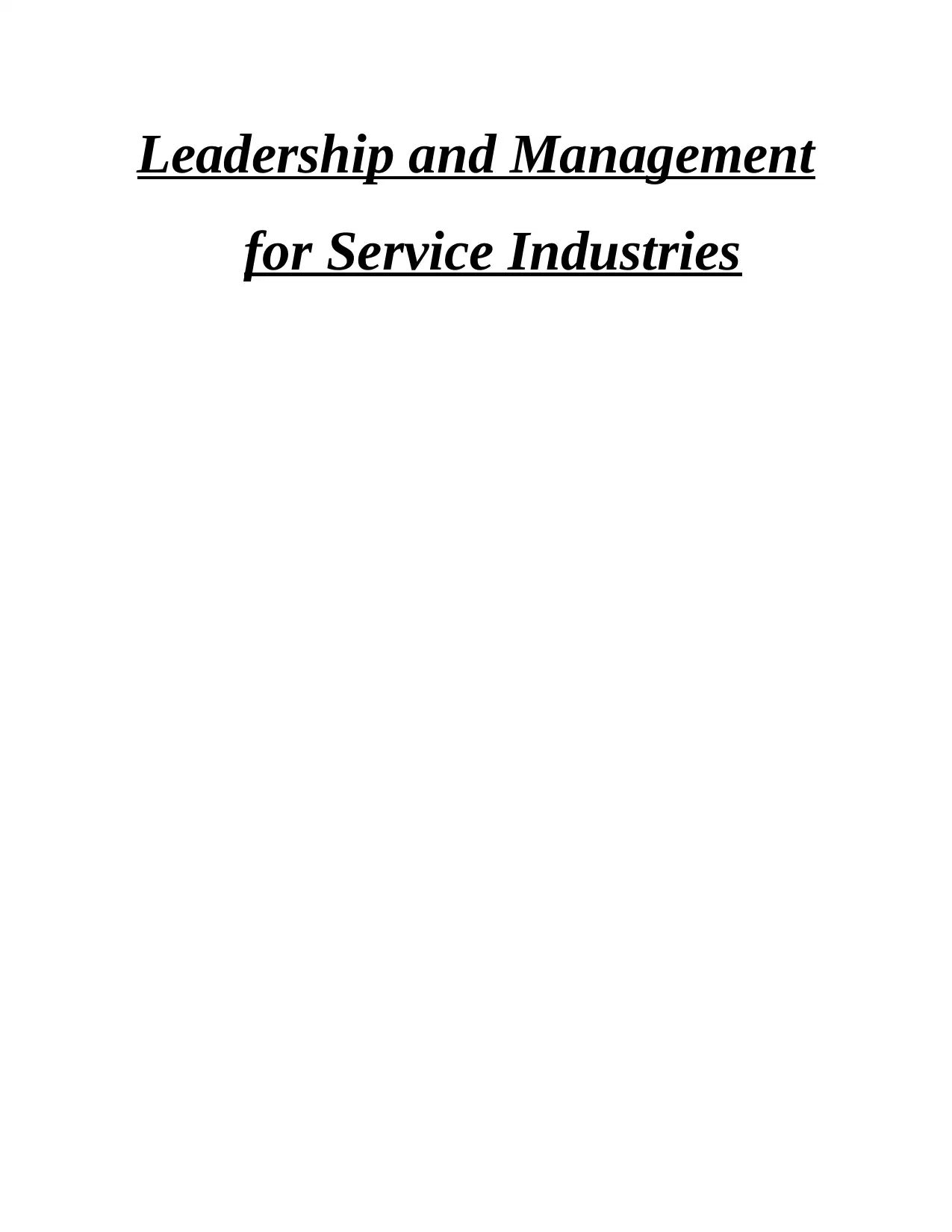
Leadership and Management
for Service Industries
for Service Industries
Paraphrase This Document
Need a fresh take? Get an instant paraphrase of this document with our AI Paraphraser
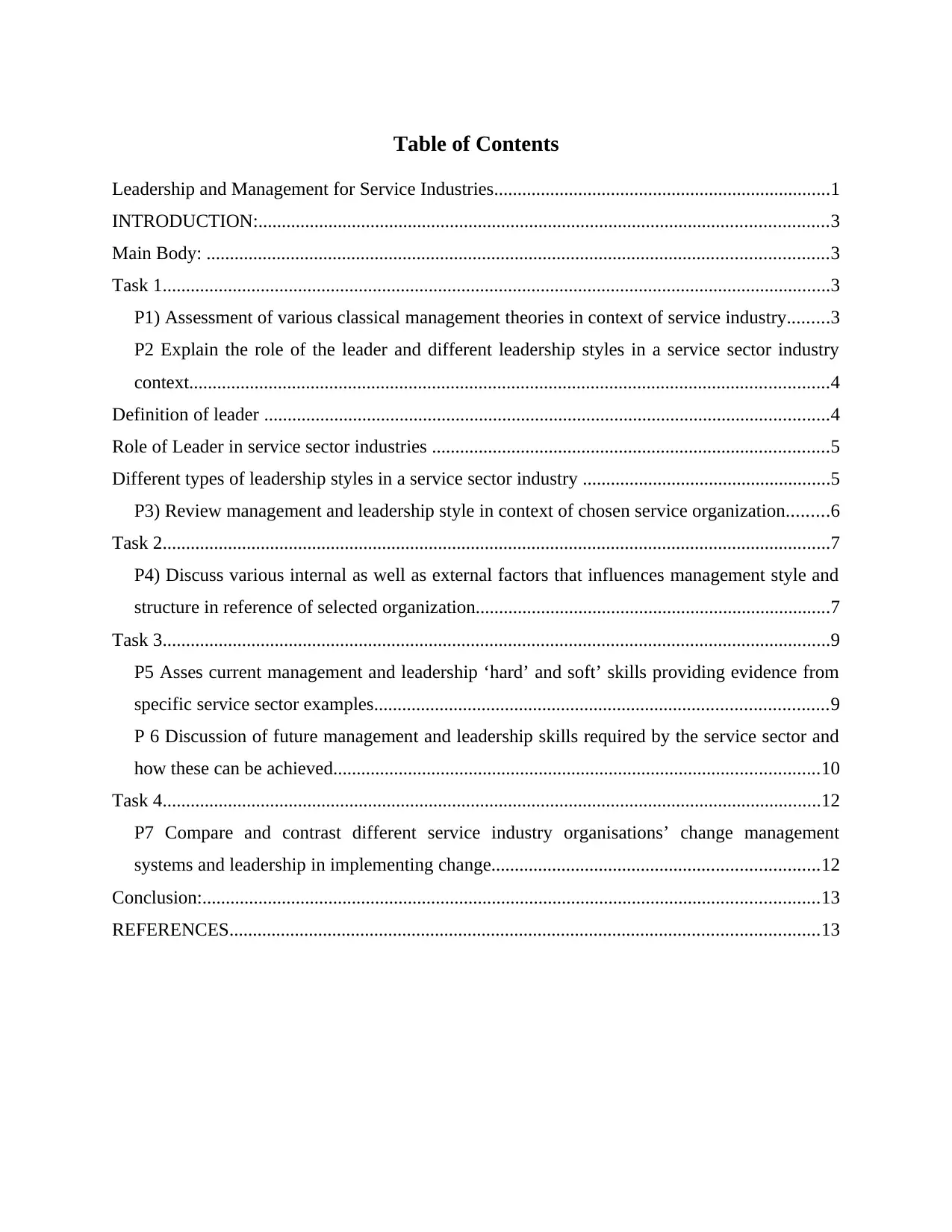
Table of Contents
Leadership and Management for Service Industries........................................................................1
INTRODUCTION:..........................................................................................................................3
Main Body: .....................................................................................................................................3
Task 1...............................................................................................................................................3
P1) Assessment of various classical management theories in context of service industry.........3
P2 Explain the role of the leader and different leadership styles in a service sector industry
context.........................................................................................................................................4
Definition of leader .........................................................................................................................4
Role of Leader in service sector industries .....................................................................................5
Different types of leadership styles in a service sector industry .....................................................5
P3) Review management and leadership style in context of chosen service organization.........6
Task 2...............................................................................................................................................7
P4) Discuss various internal as well as external factors that influences management style and
structure in reference of selected organization............................................................................7
Task 3...............................................................................................................................................9
P5 Asses current management and leadership ‘hard’ and soft’ skills providing evidence from
specific service sector examples.................................................................................................9
P 6 Discussion of future management and leadership skills required by the service sector and
how these can be achieved........................................................................................................10
Task 4.............................................................................................................................................12
P7 Compare and contrast different service industry organisations’ change management
systems and leadership in implementing change......................................................................12
Conclusion:....................................................................................................................................13
REFERENCES..............................................................................................................................13
Leadership and Management for Service Industries........................................................................1
INTRODUCTION:..........................................................................................................................3
Main Body: .....................................................................................................................................3
Task 1...............................................................................................................................................3
P1) Assessment of various classical management theories in context of service industry.........3
P2 Explain the role of the leader and different leadership styles in a service sector industry
context.........................................................................................................................................4
Definition of leader .........................................................................................................................4
Role of Leader in service sector industries .....................................................................................5
Different types of leadership styles in a service sector industry .....................................................5
P3) Review management and leadership style in context of chosen service organization.........6
Task 2...............................................................................................................................................7
P4) Discuss various internal as well as external factors that influences management style and
structure in reference of selected organization............................................................................7
Task 3...............................................................................................................................................9
P5 Asses current management and leadership ‘hard’ and soft’ skills providing evidence from
specific service sector examples.................................................................................................9
P 6 Discussion of future management and leadership skills required by the service sector and
how these can be achieved........................................................................................................10
Task 4.............................................................................................................................................12
P7 Compare and contrast different service industry organisations’ change management
systems and leadership in implementing change......................................................................12
Conclusion:....................................................................................................................................13
REFERENCES..............................................................................................................................13
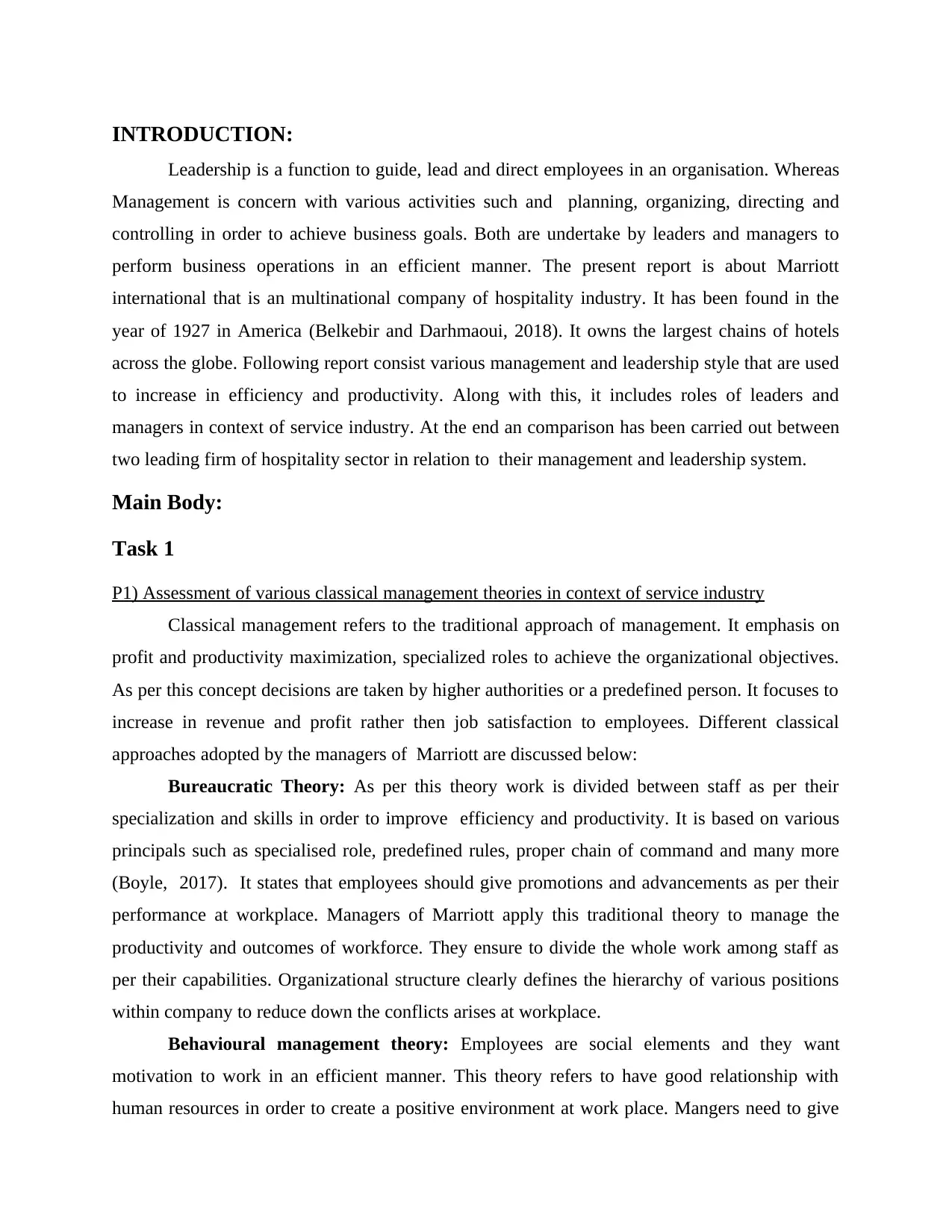
INTRODUCTION:
Leadership is a function to guide, lead and direct employees in an organisation. Whereas
Management is concern with various activities such and planning, organizing, directing and
controlling in order to achieve business goals. Both are undertake by leaders and managers to
perform business operations in an efficient manner. The present report is about Marriott
international that is an multinational company of hospitality industry. It has been found in the
year of 1927 in America (Belkebir and Darhmaoui, 2018). It owns the largest chains of hotels
across the globe. Following report consist various management and leadership style that are used
to increase in efficiency and productivity. Along with this, it includes roles of leaders and
managers in context of service industry. At the end an comparison has been carried out between
two leading firm of hospitality sector in relation to their management and leadership system.
Main Body:
Task 1
P1) Assessment of various classical management theories in context of service industry
Classical management refers to the traditional approach of management. It emphasis on
profit and productivity maximization, specialized roles to achieve the organizational objectives.
As per this concept decisions are taken by higher authorities or a predefined person. It focuses to
increase in revenue and profit rather then job satisfaction to employees. Different classical
approaches adopted by the managers of Marriott are discussed below:
Bureaucratic Theory: As per this theory work is divided between staff as per their
specialization and skills in order to improve efficiency and productivity. It is based on various
principals such as specialised role, predefined rules, proper chain of command and many more
(Boyle, 2017). It states that employees should give promotions and advancements as per their
performance at workplace. Managers of Marriott apply this traditional theory to manage the
productivity and outcomes of workforce. They ensure to divide the whole work among staff as
per their capabilities. Organizational structure clearly defines the hierarchy of various positions
within company to reduce down the conflicts arises at workplace.
Behavioural management theory: Employees are social elements and they want
motivation to work in an efficient manner. This theory refers to have good relationship with
human resources in order to create a positive environment at work place. Mangers need to give
Leadership is a function to guide, lead and direct employees in an organisation. Whereas
Management is concern with various activities such and planning, organizing, directing and
controlling in order to achieve business goals. Both are undertake by leaders and managers to
perform business operations in an efficient manner. The present report is about Marriott
international that is an multinational company of hospitality industry. It has been found in the
year of 1927 in America (Belkebir and Darhmaoui, 2018). It owns the largest chains of hotels
across the globe. Following report consist various management and leadership style that are used
to increase in efficiency and productivity. Along with this, it includes roles of leaders and
managers in context of service industry. At the end an comparison has been carried out between
two leading firm of hospitality sector in relation to their management and leadership system.
Main Body:
Task 1
P1) Assessment of various classical management theories in context of service industry
Classical management refers to the traditional approach of management. It emphasis on
profit and productivity maximization, specialized roles to achieve the organizational objectives.
As per this concept decisions are taken by higher authorities or a predefined person. It focuses to
increase in revenue and profit rather then job satisfaction to employees. Different classical
approaches adopted by the managers of Marriott are discussed below:
Bureaucratic Theory: As per this theory work is divided between staff as per their
specialization and skills in order to improve efficiency and productivity. It is based on various
principals such as specialised role, predefined rules, proper chain of command and many more
(Boyle, 2017). It states that employees should give promotions and advancements as per their
performance at workplace. Managers of Marriott apply this traditional theory to manage the
productivity and outcomes of workforce. They ensure to divide the whole work among staff as
per their capabilities. Organizational structure clearly defines the hierarchy of various positions
within company to reduce down the conflicts arises at workplace.
Behavioural management theory: Employees are social elements and they want
motivation to work in an efficient manner. This theory refers to have good relationship with
human resources in order to create a positive environment at work place. Mangers need to give
⊘ This is a preview!⊘
Do you want full access?
Subscribe today to unlock all pages.

Trusted by 1+ million students worldwide
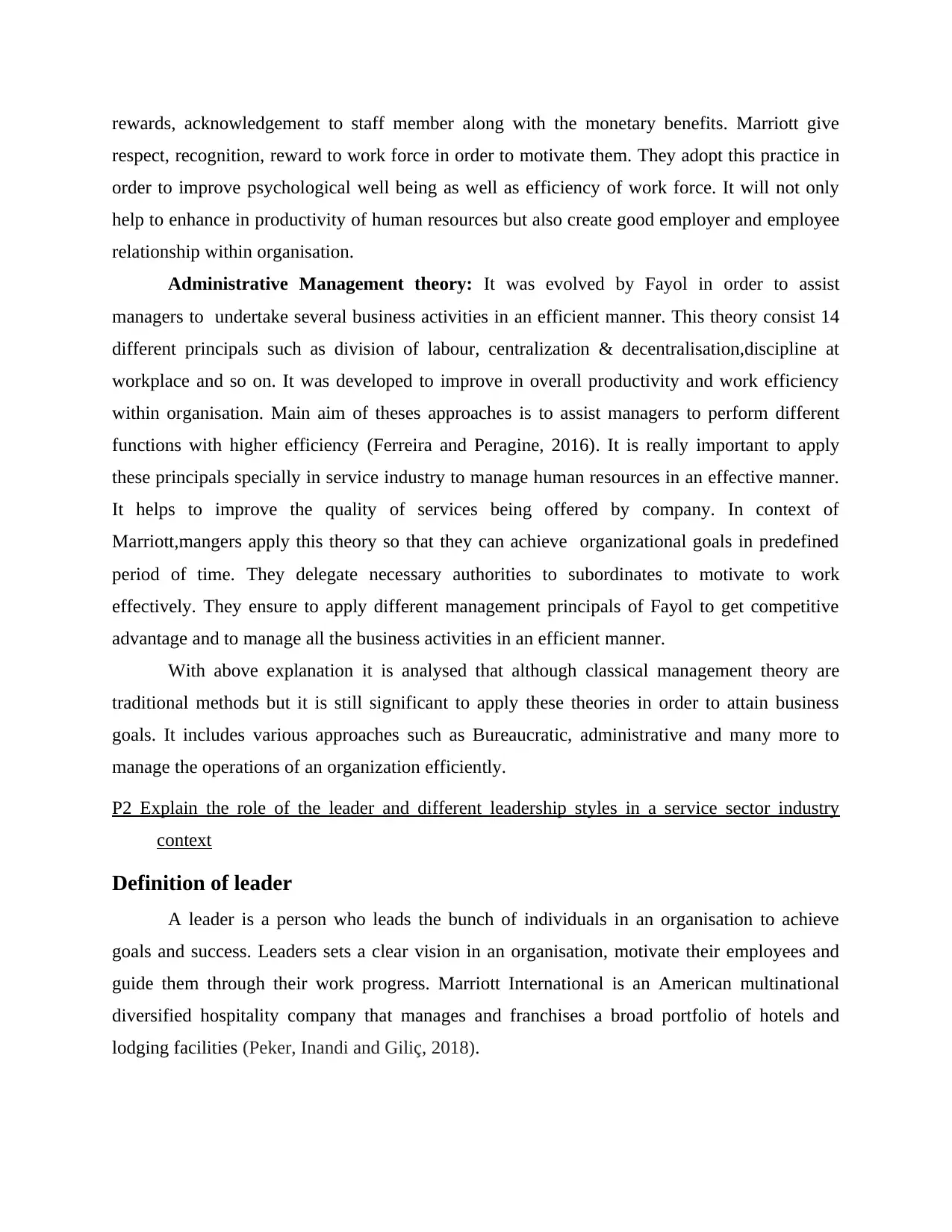
rewards, acknowledgement to staff member along with the monetary benefits. Marriott give
respect, recognition, reward to work force in order to motivate them. They adopt this practice in
order to improve psychological well being as well as efficiency of work force. It will not only
help to enhance in productivity of human resources but also create good employer and employee
relationship within organisation.
Administrative Management theory: It was evolved by Fayol in order to assist
managers to undertake several business activities in an efficient manner. This theory consist 14
different principals such as division of labour, centralization & decentralisation,discipline at
workplace and so on. It was developed to improve in overall productivity and work efficiency
within organisation. Main aim of theses approaches is to assist managers to perform different
functions with higher efficiency (Ferreira and Peragine, 2016). It is really important to apply
these principals specially in service industry to manage human resources in an effective manner.
It helps to improve the quality of services being offered by company. In context of
Marriott,mangers apply this theory so that they can achieve organizational goals in predefined
period of time. They delegate necessary authorities to subordinates to motivate to work
effectively. They ensure to apply different management principals of Fayol to get competitive
advantage and to manage all the business activities in an efficient manner.
With above explanation it is analysed that although classical management theory are
traditional methods but it is still significant to apply these theories in order to attain business
goals. It includes various approaches such as Bureaucratic, administrative and many more to
manage the operations of an organization efficiently.
P2 Explain the role of the leader and different leadership styles in a service sector industry
context
Definition of leader
A leader is a person who leads the bunch of individuals in an organisation to achieve
goals and success. Leaders sets a clear vision in an organisation, motivate their employees and
guide them through their work progress. Marriott International is an American multinational
diversified hospitality company that manages and franchises a broad portfolio of hotels and
lodging facilities (Peker, Inandi and Giliç, 2018).
respect, recognition, reward to work force in order to motivate them. They adopt this practice in
order to improve psychological well being as well as efficiency of work force. It will not only
help to enhance in productivity of human resources but also create good employer and employee
relationship within organisation.
Administrative Management theory: It was evolved by Fayol in order to assist
managers to undertake several business activities in an efficient manner. This theory consist 14
different principals such as division of labour, centralization & decentralisation,discipline at
workplace and so on. It was developed to improve in overall productivity and work efficiency
within organisation. Main aim of theses approaches is to assist managers to perform different
functions with higher efficiency (Ferreira and Peragine, 2016). It is really important to apply
these principals specially in service industry to manage human resources in an effective manner.
It helps to improve the quality of services being offered by company. In context of
Marriott,mangers apply this theory so that they can achieve organizational goals in predefined
period of time. They delegate necessary authorities to subordinates to motivate to work
effectively. They ensure to apply different management principals of Fayol to get competitive
advantage and to manage all the business activities in an efficient manner.
With above explanation it is analysed that although classical management theory are
traditional methods but it is still significant to apply these theories in order to attain business
goals. It includes various approaches such as Bureaucratic, administrative and many more to
manage the operations of an organization efficiently.
P2 Explain the role of the leader and different leadership styles in a service sector industry
context
Definition of leader
A leader is a person who leads the bunch of individuals in an organisation to achieve
goals and success. Leaders sets a clear vision in an organisation, motivate their employees and
guide them through their work progress. Marriott International is an American multinational
diversified hospitality company that manages and franchises a broad portfolio of hotels and
lodging facilities (Peker, Inandi and Giliç, 2018).
Paraphrase This Document
Need a fresh take? Get an instant paraphrase of this document with our AI Paraphraser
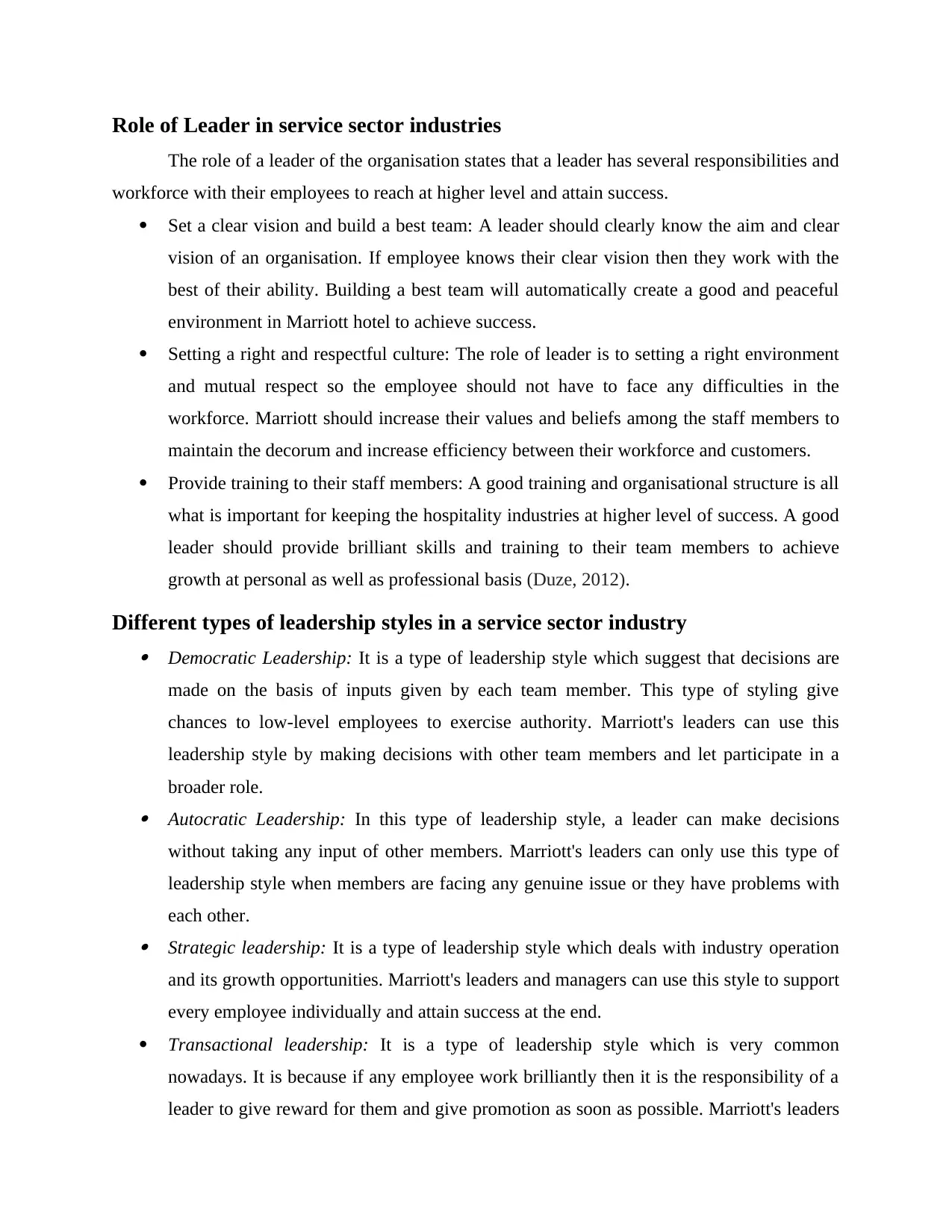
Role of Leader in service sector industries
The role of a leader of the organisation states that a leader has several responsibilities and
workforce with their employees to reach at higher level and attain success.
Set a clear vision and build a best team: A leader should clearly know the aim and clear
vision of an organisation. If employee knows their clear vision then they work with the
best of their ability. Building a best team will automatically create a good and peaceful
environment in Marriott hotel to achieve success.
Setting a right and respectful culture: The role of leader is to setting a right environment
and mutual respect so the employee should not have to face any difficulties in the
workforce. Marriott should increase their values and beliefs among the staff members to
maintain the decorum and increase efficiency between their workforce and customers.
Provide training to their staff members: A good training and organisational structure is all
what is important for keeping the hospitality industries at higher level of success. A good
leader should provide brilliant skills and training to their team members to achieve
growth at personal as well as professional basis (Duze, 2012).
Different types of leadership styles in a service sector industry Democratic Leadership: It is a type of leadership style which suggest that decisions are
made on the basis of inputs given by each team member. This type of styling give
chances to low-level employees to exercise authority. Marriott's leaders can use this
leadership style by making decisions with other team members and let participate in a
broader role. Autocratic Leadership: In this type of leadership style, a leader can make decisions
without taking any input of other members. Marriott's leaders can only use this type of
leadership style when members are facing any genuine issue or they have problems with
each other. Strategic leadership: It is a type of leadership style which deals with industry operation
and its growth opportunities. Marriott's leaders and managers can use this style to support
every employee individually and attain success at the end.
Transactional leadership: It is a type of leadership style which is very common
nowadays. It is because if any employee work brilliantly then it is the responsibility of a
leader to give reward for them and give promotion as soon as possible. Marriott's leaders
The role of a leader of the organisation states that a leader has several responsibilities and
workforce with their employees to reach at higher level and attain success.
Set a clear vision and build a best team: A leader should clearly know the aim and clear
vision of an organisation. If employee knows their clear vision then they work with the
best of their ability. Building a best team will automatically create a good and peaceful
environment in Marriott hotel to achieve success.
Setting a right and respectful culture: The role of leader is to setting a right environment
and mutual respect so the employee should not have to face any difficulties in the
workforce. Marriott should increase their values and beliefs among the staff members to
maintain the decorum and increase efficiency between their workforce and customers.
Provide training to their staff members: A good training and organisational structure is all
what is important for keeping the hospitality industries at higher level of success. A good
leader should provide brilliant skills and training to their team members to achieve
growth at personal as well as professional basis (Duze, 2012).
Different types of leadership styles in a service sector industry Democratic Leadership: It is a type of leadership style which suggest that decisions are
made on the basis of inputs given by each team member. This type of styling give
chances to low-level employees to exercise authority. Marriott's leaders can use this
leadership style by making decisions with other team members and let participate in a
broader role. Autocratic Leadership: In this type of leadership style, a leader can make decisions
without taking any input of other members. Marriott's leaders can only use this type of
leadership style when members are facing any genuine issue or they have problems with
each other. Strategic leadership: It is a type of leadership style which deals with industry operation
and its growth opportunities. Marriott's leaders and managers can use this style to support
every employee individually and attain success at the end.
Transactional leadership: It is a type of leadership style which is very common
nowadays. It is because if any employee work brilliantly then it is the responsibility of a
leader to give reward for them and give promotion as soon as possible. Marriott's leaders

or managers should use this type of style as it will help them in increasing the employees
efficiency in terms of reward and bonus.
From the above discussion, it has been concluded that Marriott should use strategic
leadership to create a proper and functional structure and transactional leadership to increase
efficiency in workforce of the employees.
P3) Review management and leadership style in context of chosen service organization
Management styles are the way in which managers perform various managerial functions
such as planing, organizing, directions and many more. While leadership style refers the manner
in which leaders perform their roles and responsibilities towards organization. They are
responsible to guide, lead, encourage work force to perform a specific task. Leaders and
managers both are the key person of an organization and play an integral role in the success and
growth of company. Various type of roles such as motivating, directing and leading work force
are performed by leaders in order to enhance the overall work efficiency. They are responsible to
formulate long term vision for business entity and communicate it with staff. So, they get
inspired and work towards goal attainment. In context of Marriott, there leadership style are well
defined and efficient. Mangers of organization adopt different practices such as rewards,
acknowledgement,collaboration in decision making in order to enhance their productivity and
work efficiency (Lennard, 2018). They adopt democratic style to manage the employees in an
efficient manner. They also focus on social and psychological needs of staff so that they adopt
different non monetary approaches to enhance their engagement in work. a In order to create a
positive work environment they allow human resources to take part in decision making process.
Apart from this, it motivate staff to come forward and provide valuable suggestions for further
improvements. Thus, they are able to retain employees for a longer period of time. It has been
analysed that management of company is well organised, structured that leads towards higher
productivity and efficiency. Organizational structure of company is clearly define and
demonstration the reporting relationship between superiors and subordinates in order to
minimize conflicts within organization. Due to effective style of leadership they are able to
maintain minimum turnover of work force thus having an advantage over other competitors.
From the above discussion it is monitored that management style adopts by Marriott is
well structured and assist managers to achieve business goals in and efficient manner. There is
good relationship between superiors and subordinates that leads employees towards higher job
efficiency in terms of reward and bonus.
From the above discussion, it has been concluded that Marriott should use strategic
leadership to create a proper and functional structure and transactional leadership to increase
efficiency in workforce of the employees.
P3) Review management and leadership style in context of chosen service organization
Management styles are the way in which managers perform various managerial functions
such as planing, organizing, directions and many more. While leadership style refers the manner
in which leaders perform their roles and responsibilities towards organization. They are
responsible to guide, lead, encourage work force to perform a specific task. Leaders and
managers both are the key person of an organization and play an integral role in the success and
growth of company. Various type of roles such as motivating, directing and leading work force
are performed by leaders in order to enhance the overall work efficiency. They are responsible to
formulate long term vision for business entity and communicate it with staff. So, they get
inspired and work towards goal attainment. In context of Marriott, there leadership style are well
defined and efficient. Mangers of organization adopt different practices such as rewards,
acknowledgement,collaboration in decision making in order to enhance their productivity and
work efficiency (Lennard, 2018). They adopt democratic style to manage the employees in an
efficient manner. They also focus on social and psychological needs of staff so that they adopt
different non monetary approaches to enhance their engagement in work. a In order to create a
positive work environment they allow human resources to take part in decision making process.
Apart from this, it motivate staff to come forward and provide valuable suggestions for further
improvements. Thus, they are able to retain employees for a longer period of time. It has been
analysed that management of company is well organised, structured that leads towards higher
productivity and efficiency. Organizational structure of company is clearly define and
demonstration the reporting relationship between superiors and subordinates in order to
minimize conflicts within organization. Due to effective style of leadership they are able to
maintain minimum turnover of work force thus having an advantage over other competitors.
From the above discussion it is monitored that management style adopts by Marriott is
well structured and assist managers to achieve business goals in and efficient manner. There is
good relationship between superiors and subordinates that leads employees towards higher job
⊘ This is a preview!⊘
Do you want full access?
Subscribe today to unlock all pages.

Trusted by 1+ million students worldwide
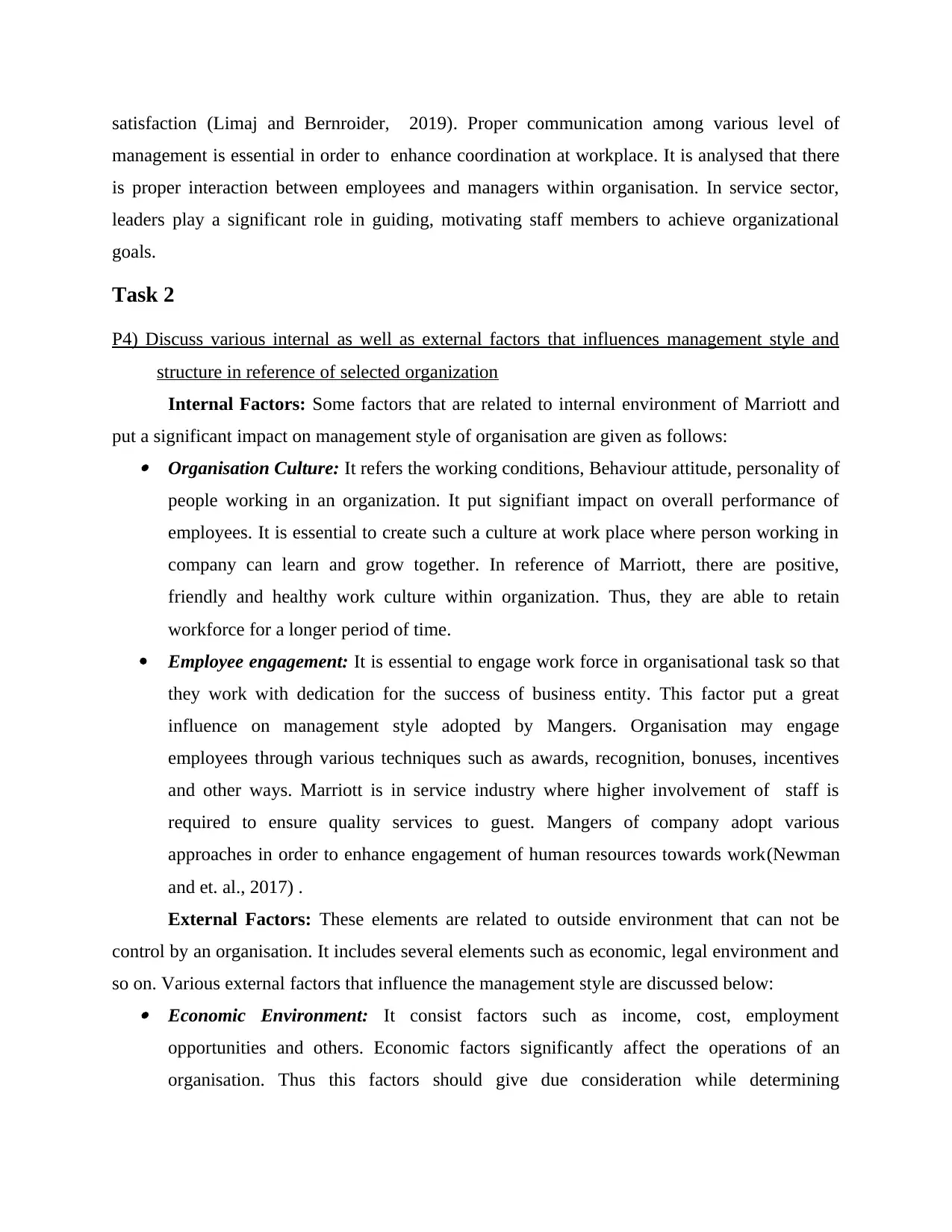
satisfaction (Limaj and Bernroider, 2019). Proper communication among various level of
management is essential in order to enhance coordination at workplace. It is analysed that there
is proper interaction between employees and managers within organisation. In service sector,
leaders play a significant role in guiding, motivating staff members to achieve organizational
goals.
Task 2
P4) Discuss various internal as well as external factors that influences management style and
structure in reference of selected organization
Internal Factors: Some factors that are related to internal environment of Marriott and
put a significant impact on management style of organisation are given as follows: Organisation Culture: It refers the working conditions, Behaviour attitude, personality of
people working in an organization. It put signifiant impact on overall performance of
employees. It is essential to create such a culture at work place where person working in
company can learn and grow together. In reference of Marriott, there are positive,
friendly and healthy work culture within organization. Thus, they are able to retain
workforce for a longer period of time.
Employee engagement: It is essential to engage work force in organisational task so that
they work with dedication for the success of business entity. This factor put a great
influence on management style adopted by Mangers. Organisation may engage
employees through various techniques such as awards, recognition, bonuses, incentives
and other ways. Marriott is in service industry where higher involvement of staff is
required to ensure quality services to guest. Mangers of company adopt various
approaches in order to enhance engagement of human resources towards work(Newman
and et. al., 2017) .
External Factors: These elements are related to outside environment that can not be
control by an organisation. It includes several elements such as economic, legal environment and
so on. Various external factors that influence the management style are discussed below: Economic Environment: It consist factors such as income, cost, employment
opportunities and others. Economic factors significantly affect the operations of an
organisation. Thus this factors should give due consideration while determining
management is essential in order to enhance coordination at workplace. It is analysed that there
is proper interaction between employees and managers within organisation. In service sector,
leaders play a significant role in guiding, motivating staff members to achieve organizational
goals.
Task 2
P4) Discuss various internal as well as external factors that influences management style and
structure in reference of selected organization
Internal Factors: Some factors that are related to internal environment of Marriott and
put a significant impact on management style of organisation are given as follows: Organisation Culture: It refers the working conditions, Behaviour attitude, personality of
people working in an organization. It put signifiant impact on overall performance of
employees. It is essential to create such a culture at work place where person working in
company can learn and grow together. In reference of Marriott, there are positive,
friendly and healthy work culture within organization. Thus, they are able to retain
workforce for a longer period of time.
Employee engagement: It is essential to engage work force in organisational task so that
they work with dedication for the success of business entity. This factor put a great
influence on management style adopted by Mangers. Organisation may engage
employees through various techniques such as awards, recognition, bonuses, incentives
and other ways. Marriott is in service industry where higher involvement of staff is
required to ensure quality services to guest. Mangers of company adopt various
approaches in order to enhance engagement of human resources towards work(Newman
and et. al., 2017) .
External Factors: These elements are related to outside environment that can not be
control by an organisation. It includes several elements such as economic, legal environment and
so on. Various external factors that influence the management style are discussed below: Economic Environment: It consist factors such as income, cost, employment
opportunities and others. Economic factors significantly affect the operations of an
organisation. Thus this factors should give due consideration while determining
Paraphrase This Document
Need a fresh take? Get an instant paraphrase of this document with our AI Paraphraser
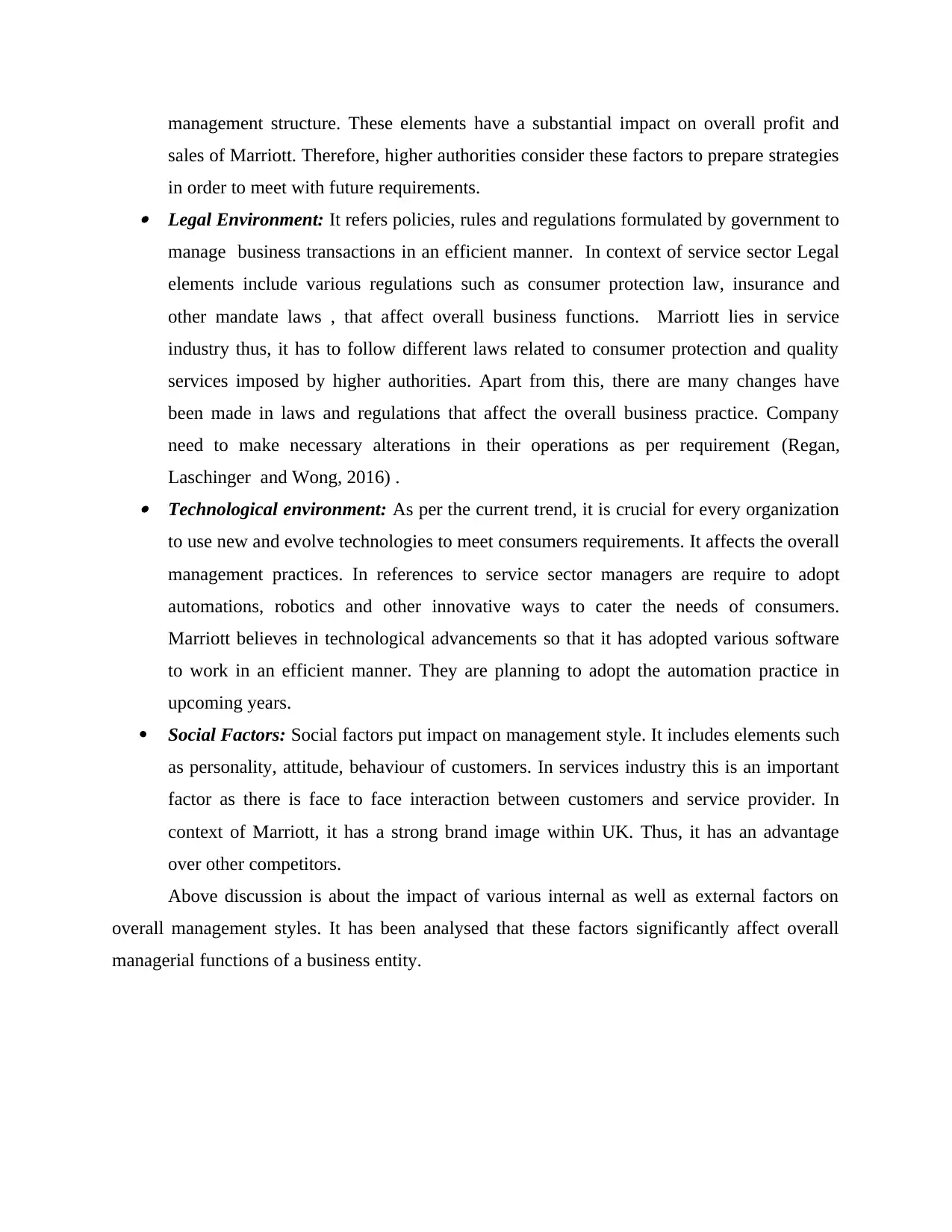
management structure. These elements have a substantial impact on overall profit and
sales of Marriott. Therefore, higher authorities consider these factors to prepare strategies
in order to meet with future requirements. Legal Environment: It refers policies, rules and regulations formulated by government to
manage business transactions in an efficient manner. In context of service sector Legal
elements include various regulations such as consumer protection law, insurance and
other mandate laws , that affect overall business functions. Marriott lies in service
industry thus, it has to follow different laws related to consumer protection and quality
services imposed by higher authorities. Apart from this, there are many changes have
been made in laws and regulations that affect the overall business practice. Company
need to make necessary alterations in their operations as per requirement (Regan,
Laschinger and Wong, 2016) . Technological environment: As per the current trend, it is crucial for every organization
to use new and evolve technologies to meet consumers requirements. It affects the overall
management practices. In references to service sector managers are require to adopt
automations, robotics and other innovative ways to cater the needs of consumers.
Marriott believes in technological advancements so that it has adopted various software
to work in an efficient manner. They are planning to adopt the automation practice in
upcoming years.
Social Factors: Social factors put impact on management style. It includes elements such
as personality, attitude, behaviour of customers. In services industry this is an important
factor as there is face to face interaction between customers and service provider. In
context of Marriott, it has a strong brand image within UK. Thus, it has an advantage
over other competitors.
Above discussion is about the impact of various internal as well as external factors on
overall management styles. It has been analysed that these factors significantly affect overall
managerial functions of a business entity.
sales of Marriott. Therefore, higher authorities consider these factors to prepare strategies
in order to meet with future requirements. Legal Environment: It refers policies, rules and regulations formulated by government to
manage business transactions in an efficient manner. In context of service sector Legal
elements include various regulations such as consumer protection law, insurance and
other mandate laws , that affect overall business functions. Marriott lies in service
industry thus, it has to follow different laws related to consumer protection and quality
services imposed by higher authorities. Apart from this, there are many changes have
been made in laws and regulations that affect the overall business practice. Company
need to make necessary alterations in their operations as per requirement (Regan,
Laschinger and Wong, 2016) . Technological environment: As per the current trend, it is crucial for every organization
to use new and evolve technologies to meet consumers requirements. It affects the overall
management practices. In references to service sector managers are require to adopt
automations, robotics and other innovative ways to cater the needs of consumers.
Marriott believes in technological advancements so that it has adopted various software
to work in an efficient manner. They are planning to adopt the automation practice in
upcoming years.
Social Factors: Social factors put impact on management style. It includes elements such
as personality, attitude, behaviour of customers. In services industry this is an important
factor as there is face to face interaction between customers and service provider. In
context of Marriott, it has a strong brand image within UK. Thus, it has an advantage
over other competitors.
Above discussion is about the impact of various internal as well as external factors on
overall management styles. It has been analysed that these factors significantly affect overall
managerial functions of a business entity.
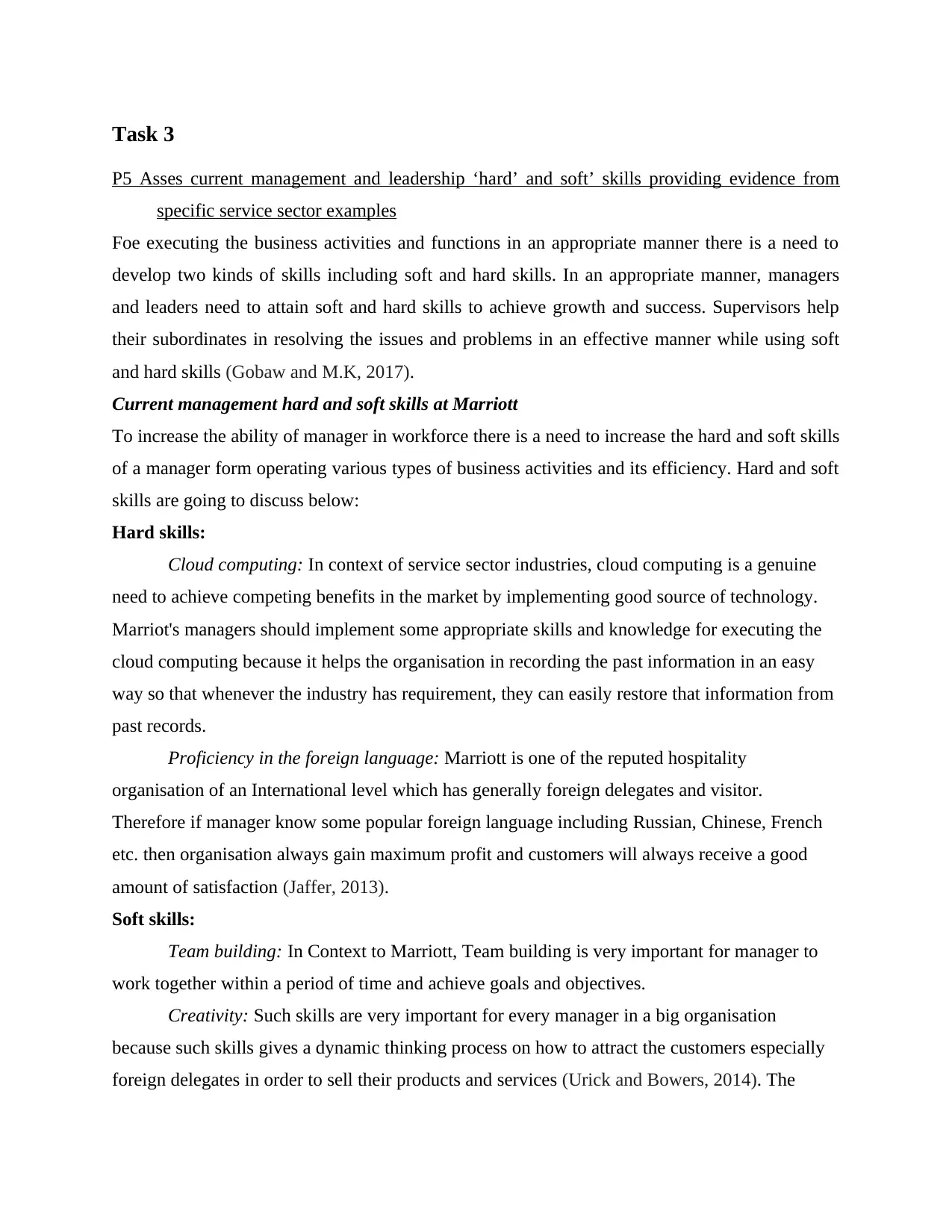
Task 3
P5 Asses current management and leadership ‘hard’ and soft’ skills providing evidence from
specific service sector examples
Foe executing the business activities and functions in an appropriate manner there is a need to
develop two kinds of skills including soft and hard skills. In an appropriate manner, managers
and leaders need to attain soft and hard skills to achieve growth and success. Supervisors help
their subordinates in resolving the issues and problems in an effective manner while using soft
and hard skills (Gobaw and M.K, 2017).
Current management hard and soft skills at Marriott
To increase the ability of manager in workforce there is a need to increase the hard and soft skills
of a manager form operating various types of business activities and its efficiency. Hard and soft
skills are going to discuss below:
Hard skills:
Cloud computing: In context of service sector industries, cloud computing is a genuine
need to achieve competing benefits in the market by implementing good source of technology.
Marriot's managers should implement some appropriate skills and knowledge for executing the
cloud computing because it helps the organisation in recording the past information in an easy
way so that whenever the industry has requirement, they can easily restore that information from
past records.
Proficiency in the foreign language: Marriott is one of the reputed hospitality
organisation of an International level which has generally foreign delegates and visitor.
Therefore if manager know some popular foreign language including Russian, Chinese, French
etc. then organisation always gain maximum profit and customers will always receive a good
amount of satisfaction (Jaffer, 2013).
Soft skills:
Team building: In Context to Marriott, Team building is very important for manager to
work together within a period of time and achieve goals and objectives.
Creativity: Such skills are very important for every manager in a big organisation
because such skills gives a dynamic thinking process on how to attract the customers especially
foreign delegates in order to sell their products and services (Urick and Bowers, 2014). The
P5 Asses current management and leadership ‘hard’ and soft’ skills providing evidence from
specific service sector examples
Foe executing the business activities and functions in an appropriate manner there is a need to
develop two kinds of skills including soft and hard skills. In an appropriate manner, managers
and leaders need to attain soft and hard skills to achieve growth and success. Supervisors help
their subordinates in resolving the issues and problems in an effective manner while using soft
and hard skills (Gobaw and M.K, 2017).
Current management hard and soft skills at Marriott
To increase the ability of manager in workforce there is a need to increase the hard and soft skills
of a manager form operating various types of business activities and its efficiency. Hard and soft
skills are going to discuss below:
Hard skills:
Cloud computing: In context of service sector industries, cloud computing is a genuine
need to achieve competing benefits in the market by implementing good source of technology.
Marriot's managers should implement some appropriate skills and knowledge for executing the
cloud computing because it helps the organisation in recording the past information in an easy
way so that whenever the industry has requirement, they can easily restore that information from
past records.
Proficiency in the foreign language: Marriott is one of the reputed hospitality
organisation of an International level which has generally foreign delegates and visitor.
Therefore if manager know some popular foreign language including Russian, Chinese, French
etc. then organisation always gain maximum profit and customers will always receive a good
amount of satisfaction (Jaffer, 2013).
Soft skills:
Team building: In Context to Marriott, Team building is very important for manager to
work together within a period of time and achieve goals and objectives.
Creativity: Such skills are very important for every manager in a big organisation
because such skills gives a dynamic thinking process on how to attract the customers especially
foreign delegates in order to sell their products and services (Urick and Bowers, 2014). The
⊘ This is a preview!⊘
Do you want full access?
Subscribe today to unlock all pages.

Trusted by 1+ million students worldwide
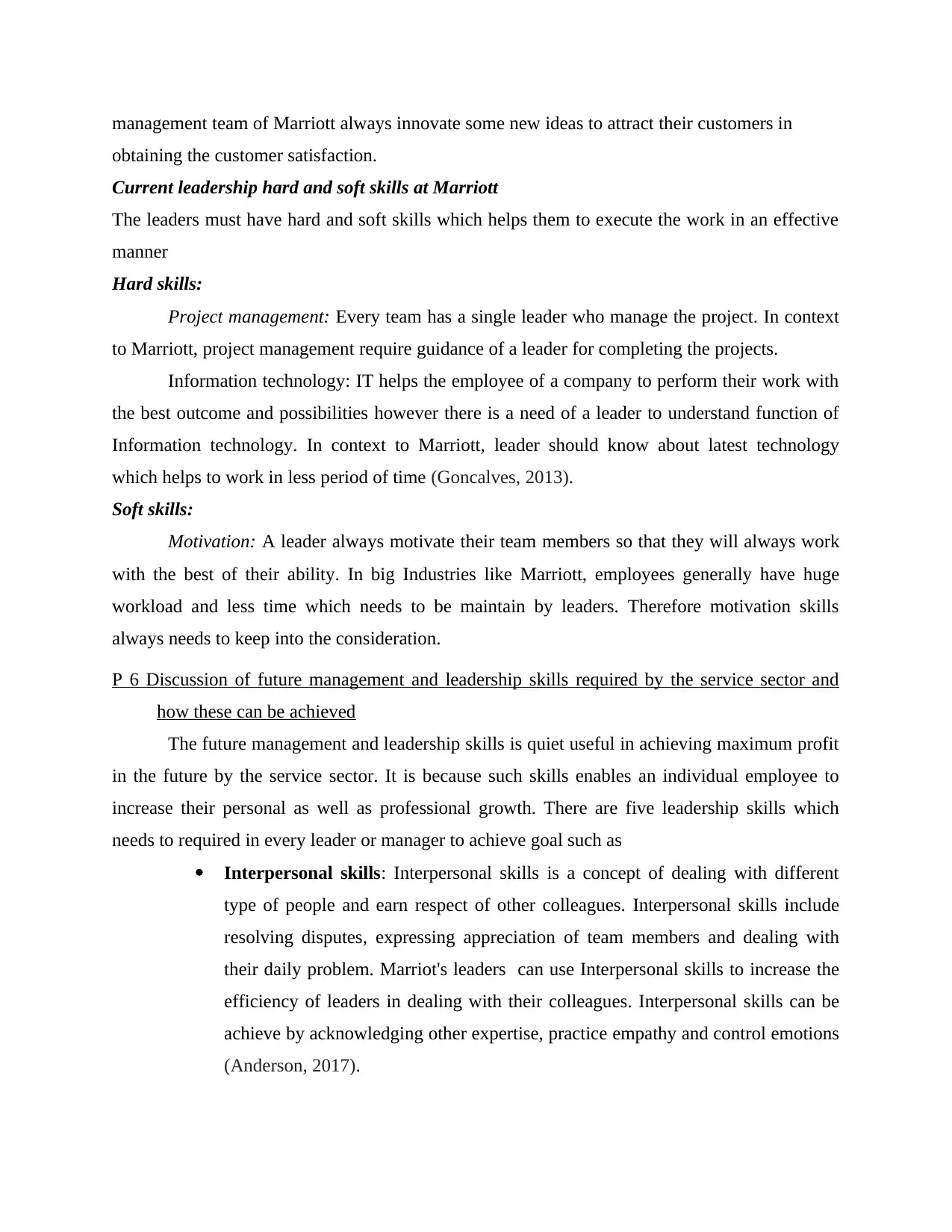
management team of Marriott always innovate some new ideas to attract their customers in
obtaining the customer satisfaction.
Current leadership hard and soft skills at Marriott
The leaders must have hard and soft skills which helps them to execute the work in an effective
manner
Hard skills:
Project management: Every team has a single leader who manage the project. In context
to Marriott, project management require guidance of a leader for completing the projects.
Information technology: IT helps the employee of a company to perform their work with
the best outcome and possibilities however there is a need of a leader to understand function of
Information technology. In context to Marriott, leader should know about latest technology
which helps to work in less period of time (Goncalves, 2013).
Soft skills:
Motivation: A leader always motivate their team members so that they will always work
with the best of their ability. In big Industries like Marriott, employees generally have huge
workload and less time which needs to be maintain by leaders. Therefore motivation skills
always needs to keep into the consideration.
P 6 Discussion of future management and leadership skills required by the service sector and
how these can be achieved
The future management and leadership skills is quiet useful in achieving maximum profit
in the future by the service sector. It is because such skills enables an individual employee to
increase their personal as well as professional growth. There are five leadership skills which
needs to required in every leader or manager to achieve goal such as
Interpersonal skills: Interpersonal skills is a concept of dealing with different
type of people and earn respect of other colleagues. Interpersonal skills include
resolving disputes, expressing appreciation of team members and dealing with
their daily problem. Marriot's leaders can use Interpersonal skills to increase the
efficiency of leaders in dealing with their colleagues. Interpersonal skills can be
achieve by acknowledging other expertise, practice empathy and control emotions
(Anderson, 2017).
obtaining the customer satisfaction.
Current leadership hard and soft skills at Marriott
The leaders must have hard and soft skills which helps them to execute the work in an effective
manner
Hard skills:
Project management: Every team has a single leader who manage the project. In context
to Marriott, project management require guidance of a leader for completing the projects.
Information technology: IT helps the employee of a company to perform their work with
the best outcome and possibilities however there is a need of a leader to understand function of
Information technology. In context to Marriott, leader should know about latest technology
which helps to work in less period of time (Goncalves, 2013).
Soft skills:
Motivation: A leader always motivate their team members so that they will always work
with the best of their ability. In big Industries like Marriott, employees generally have huge
workload and less time which needs to be maintain by leaders. Therefore motivation skills
always needs to keep into the consideration.
P 6 Discussion of future management and leadership skills required by the service sector and
how these can be achieved
The future management and leadership skills is quiet useful in achieving maximum profit
in the future by the service sector. It is because such skills enables an individual employee to
increase their personal as well as professional growth. There are five leadership skills which
needs to required in every leader or manager to achieve goal such as
Interpersonal skills: Interpersonal skills is a concept of dealing with different
type of people and earn respect of other colleagues. Interpersonal skills include
resolving disputes, expressing appreciation of team members and dealing with
their daily problem. Marriot's leaders can use Interpersonal skills to increase the
efficiency of leaders in dealing with their colleagues. Interpersonal skills can be
achieve by acknowledging other expertise, practice empathy and control emotions
(Anderson, 2017).
Paraphrase This Document
Need a fresh take? Get an instant paraphrase of this document with our AI Paraphraser
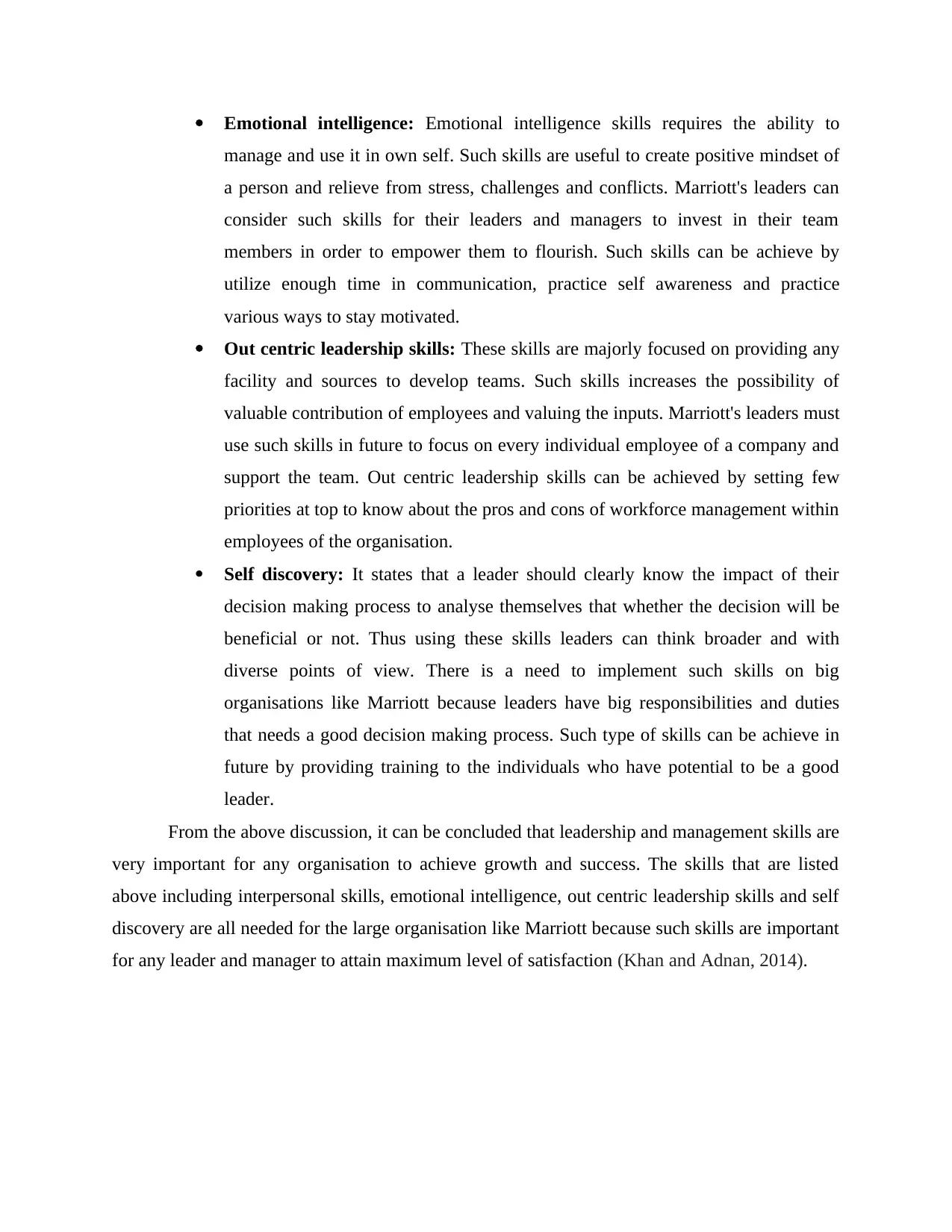
Emotional intelligence: Emotional intelligence skills requires the ability to
manage and use it in own self. Such skills are useful to create positive mindset of
a person and relieve from stress, challenges and conflicts. Marriott's leaders can
consider such skills for their leaders and managers to invest in their team
members in order to empower them to flourish. Such skills can be achieve by
utilize enough time in communication, practice self awareness and practice
various ways to stay motivated.
Out centric leadership skills: These skills are majorly focused on providing any
facility and sources to develop teams. Such skills increases the possibility of
valuable contribution of employees and valuing the inputs. Marriott's leaders must
use such skills in future to focus on every individual employee of a company and
support the team. Out centric leadership skills can be achieved by setting few
priorities at top to know about the pros and cons of workforce management within
employees of the organisation.
Self discovery: It states that a leader should clearly know the impact of their
decision making process to analyse themselves that whether the decision will be
beneficial or not. Thus using these skills leaders can think broader and with
diverse points of view. There is a need to implement such skills on big
organisations like Marriott because leaders have big responsibilities and duties
that needs a good decision making process. Such type of skills can be achieve in
future by providing training to the individuals who have potential to be a good
leader.
From the above discussion, it can be concluded that leadership and management skills are
very important for any organisation to achieve growth and success. The skills that are listed
above including interpersonal skills, emotional intelligence, out centric leadership skills and self
discovery are all needed for the large organisation like Marriott because such skills are important
for any leader and manager to attain maximum level of satisfaction (Khan and Adnan, 2014).
manage and use it in own self. Such skills are useful to create positive mindset of
a person and relieve from stress, challenges and conflicts. Marriott's leaders can
consider such skills for their leaders and managers to invest in their team
members in order to empower them to flourish. Such skills can be achieve by
utilize enough time in communication, practice self awareness and practice
various ways to stay motivated.
Out centric leadership skills: These skills are majorly focused on providing any
facility and sources to develop teams. Such skills increases the possibility of
valuable contribution of employees and valuing the inputs. Marriott's leaders must
use such skills in future to focus on every individual employee of a company and
support the team. Out centric leadership skills can be achieved by setting few
priorities at top to know about the pros and cons of workforce management within
employees of the organisation.
Self discovery: It states that a leader should clearly know the impact of their
decision making process to analyse themselves that whether the decision will be
beneficial or not. Thus using these skills leaders can think broader and with
diverse points of view. There is a need to implement such skills on big
organisations like Marriott because leaders have big responsibilities and duties
that needs a good decision making process. Such type of skills can be achieve in
future by providing training to the individuals who have potential to be a good
leader.
From the above discussion, it can be concluded that leadership and management skills are
very important for any organisation to achieve growth and success. The skills that are listed
above including interpersonal skills, emotional intelligence, out centric leadership skills and self
discovery are all needed for the large organisation like Marriott because such skills are important
for any leader and manager to attain maximum level of satisfaction (Khan and Adnan, 2014).
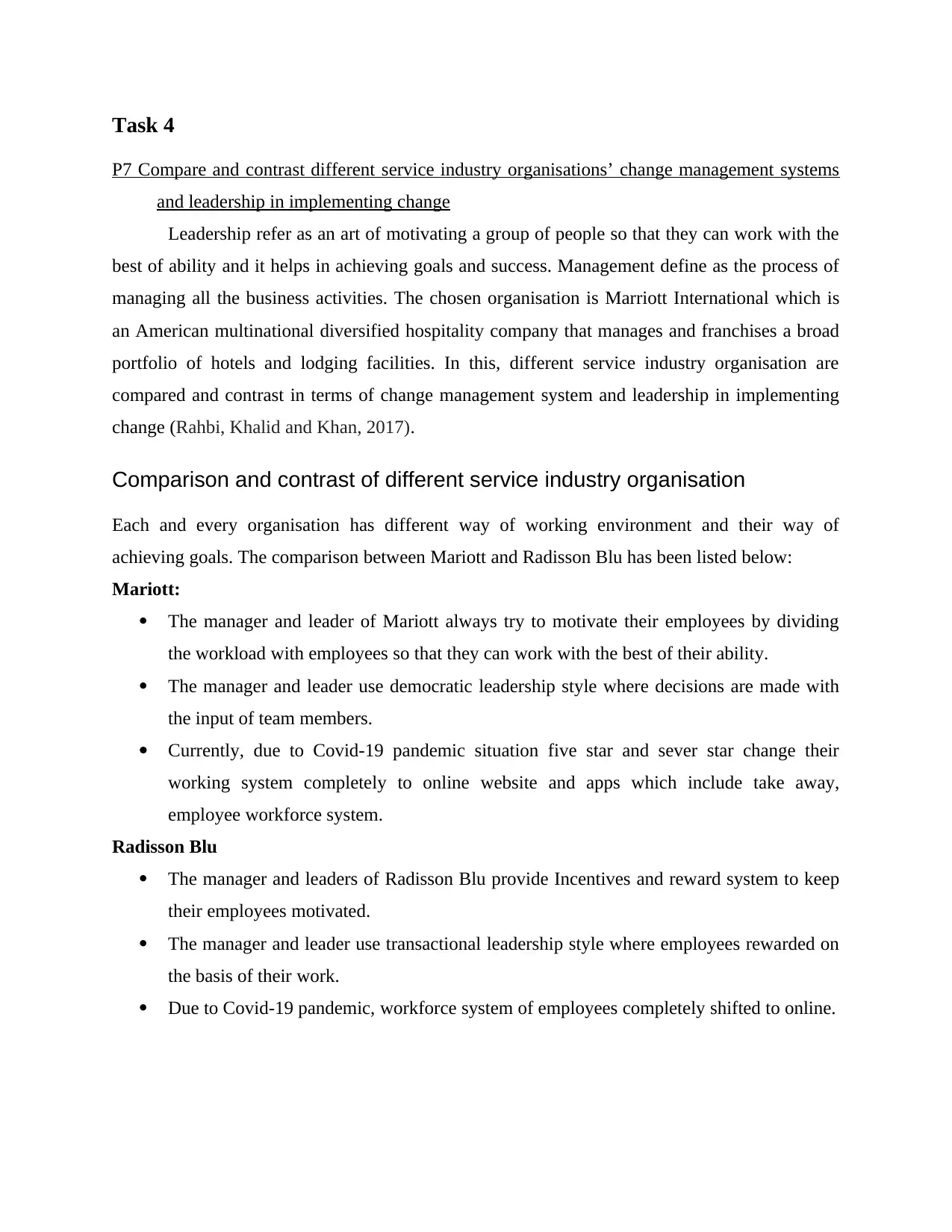
Task 4
P7 Compare and contrast different service industry organisations’ change management systems
and leadership in implementing change
Leadership refer as an art of motivating a group of people so that they can work with the
best of ability and it helps in achieving goals and success. Management define as the process of
managing all the business activities. The chosen organisation is Marriott International which is
an American multinational diversified hospitality company that manages and franchises a broad
portfolio of hotels and lodging facilities. In this, different service industry organisation are
compared and contrast in terms of change management system and leadership in implementing
change (Rahbi, Khalid and Khan, 2017).
Comparison and contrast of different service industry organisation
Each and every organisation has different way of working environment and their way of
achieving goals. The comparison between Mariott and Radisson Blu has been listed below:
Mariott:
The manager and leader of Mariott always try to motivate their employees by dividing
the workload with employees so that they can work with the best of their ability.
The manager and leader use democratic leadership style where decisions are made with
the input of team members.
Currently, due to Covid-19 pandemic situation five star and sever star change their
working system completely to online website and apps which include take away,
employee workforce system.
Radisson Blu
The manager and leaders of Radisson Blu provide Incentives and reward system to keep
their employees motivated.
The manager and leader use transactional leadership style where employees rewarded on
the basis of their work.
Due to Covid-19 pandemic, workforce system of employees completely shifted to online.
P7 Compare and contrast different service industry organisations’ change management systems
and leadership in implementing change
Leadership refer as an art of motivating a group of people so that they can work with the
best of ability and it helps in achieving goals and success. Management define as the process of
managing all the business activities. The chosen organisation is Marriott International which is
an American multinational diversified hospitality company that manages and franchises a broad
portfolio of hotels and lodging facilities. In this, different service industry organisation are
compared and contrast in terms of change management system and leadership in implementing
change (Rahbi, Khalid and Khan, 2017).
Comparison and contrast of different service industry organisation
Each and every organisation has different way of working environment and their way of
achieving goals. The comparison between Mariott and Radisson Blu has been listed below:
Mariott:
The manager and leader of Mariott always try to motivate their employees by dividing
the workload with employees so that they can work with the best of their ability.
The manager and leader use democratic leadership style where decisions are made with
the input of team members.
Currently, due to Covid-19 pandemic situation five star and sever star change their
working system completely to online website and apps which include take away,
employee workforce system.
Radisson Blu
The manager and leaders of Radisson Blu provide Incentives and reward system to keep
their employees motivated.
The manager and leader use transactional leadership style where employees rewarded on
the basis of their work.
Due to Covid-19 pandemic, workforce system of employees completely shifted to online.
⊘ This is a preview!⊘
Do you want full access?
Subscribe today to unlock all pages.

Trusted by 1+ million students worldwide
1 out of 14
Related Documents
Your All-in-One AI-Powered Toolkit for Academic Success.
+13062052269
info@desklib.com
Available 24*7 on WhatsApp / Email
![[object Object]](/_next/static/media/star-bottom.7253800d.svg)
Unlock your academic potential
Copyright © 2020–2026 A2Z Services. All Rights Reserved. Developed and managed by ZUCOL.





